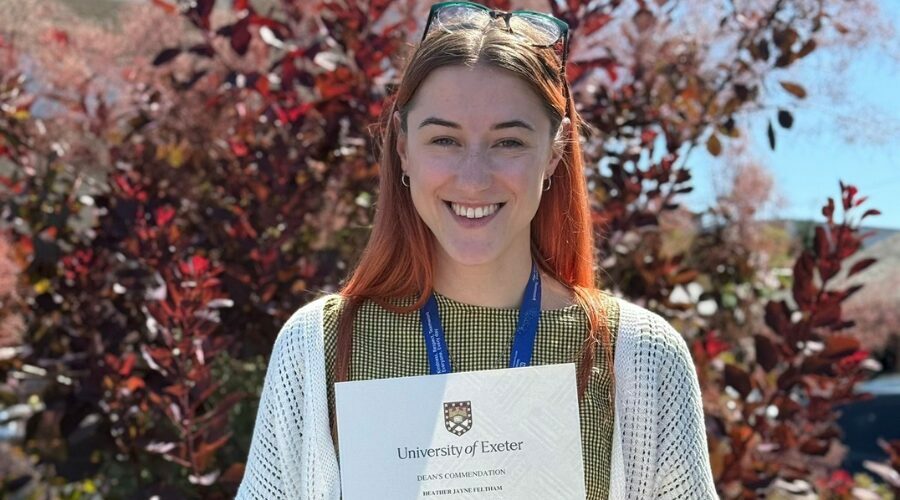
Spotlight
Prestigious University of Exeter Deans’ award for Heather Feltham
Our paediatric clinical associate in psychology Heather Feltham has cause for celebration after being awarded a rare award by the University of Exeter.
The university’s Dean’s Commendations for Exceptional Performance are only ever given to the top 5% performing students at each level of study.
Heather, who has lived in Somerset for most of her life, has only ever been interested in a career in psychology. “I think I’m one of those lucky people who’s always known what I wanted to do from quite a young age,” she says.
“After I completed my undergraduate degree in Exeter, I worked around Somerset in different roles, including as a support worker in learning difficulties, and in the Talking Therapies service in Bath, before I joined Somerset FT as a trainee clinical associate in psychology (CAP).
“The Dean’s award came a bit out of the blue, and I was never expecting anything like that to come through, so it makes me feel really proud. I wouldn’t have been able to do it without the support of our team, especially my Somerset FT supervisor, Dr Megan Rowley.”
She adds that she finds working as a CAP interesting, because she sits within a team mostly made up of clinical psychologists.
“The CAP role within the NHS was something I was very keen to get into from the moment my university supervisor told me about it during my fresher’s year,” she continues. “It felt like a really great opportunity, so I set my heart on it.
“This role feels very different to my previous assistant psychologist role, as I’m engaging in face-to-face contact with lots of young people and families.
“There’s a lot of consultations involved as well, not just with the families but with the teams around them too – I think the role gives me a great deal of variation, which I really enjoy. In fact, over a single week I’ll carry out assessments, formulations, interventions, consultations, and even some research.
“One of the really great things I first noticed with the CAP role is that the degree apprenticeship model means we’re being taught things and can apply it straightaway on the job.
“It was so relevant to where I’m working, and the university successfully tailored the learning to my individual experience at Somerset FT, so it gave me a really good depth of knowledge.
“The academic side of it flows really nicely as well, and I think being able to work within clinical practice, and be able to do all of my coursework, helped so much with my development.”
Dr Charlotte Glenister, one of our consultant paediatric clinical psychologists and lead for the Somerset Paediatric Psychological Therapies Service (SPPTS), explains how the CAPs became a key profession within the NHS.
“The CAP role was set up when our paediatric psychological therapies service team was reconfigured, as the previous model of care wasn’t sustainable in the long run,” says Charlotte.
“We wanted to look at new and innovative ways of providing care to our patients and one of those ideas was to bring a CAP into our service.
“While CAPs have been in post elsewhere in our trust and across the country, as far as we’re aware the role has never sat within a paediatric service before, so we needed to think carefully about how it could work. We also needed someone very skilful to step into the role, and we got very lucky with Heather, who’s amazing.”
Dr Megan Rowley, one of our paediatric clinical psychologists and Heather’s clinical supervisor, adds: “We feel very proud of Heather as she’s worked really hard, especially as the original university course didn’t necessarily lend itself to a paediatric setting.
“Heather has really had to think about how she can adapt and apply what she’s learning in a different context. She’s had to be flexible and make it work in a way that she’s been able to show how competent she is as a CAP.”
Charlotte agrees and says she can’t say enough about how proud the team is of Heather, and how great it is to have her on the team.
She continues: “Heather has been able to take a lead on various large pieces of project work as well, which is amazing, and the model of her being with us full time, and spending some time at university, works really well in terms of her being available to understand what’s going on in the department.
“She’s just been a great asset to the team, and I joke about her one day moving on and taking her next steps in her career, but not yet as we definitely want her to stay!”

